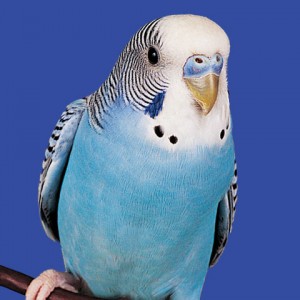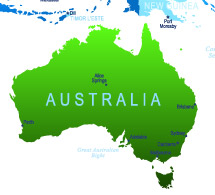Category: Parakeets Birds
Parakeets Birds
Talking Parakeets Birds
Talking Parakeets birds, or budgerigar, is most commonly referred to as the more generic term “parakeet” in the United States. The wild budgie is similar to the birds we see today in pet shops, though smaller (between 6 and 7 inches long), and only found in the nominate color, green. Its Latin name means, roughly, “song bird with wavy lines,” which is a pretty good description of this popular bird.

Naturalist John Gould and his brother-in-law, Charles Coxen, brought Budgies to Europe around 1838. Europeans became charmed with the birds, which bred readily, making them a staple pet in wealthy homes. The Budgie was displayed at the Antwerp Zoo in Belgium around 1850, and began to gain in popularity, not only with the wealthy. Australia banned exportation of Budgies in 1894, and the Europeans had to breed their existing stock in order to continue the hobby. The budgie found its way to America in the late 1920s, but didn’t experience real popularity until the 1950s. Today, it’s the most popularbird in the world. start shopping.
Talking Parakeets birds characteristics
| Care Difficulty | Beginner |
| Average Life Span | 10–12 years with proper care |
| Average Adult Size | 7” long, from head to end of tail |
| Diet | Herbivorous |
| Minimum Habitat Size | 18” W x 18” D x 18” H |
Talking Parakeets birds Native Region / Natural Habitat

The budgie is native to Australia, where it still dominates the grasslands in large, undulating flocks. The wild budgie is similar to the birds we see today in pet shops, though smaller, and only found in the nominate color, green.
The nomadic wild parakeet is found in large flocks that are always on the search for water, which is limited in the scrublands, the habitat that makes up much of the budgie’s natural range. They breed in the rainy season when water and food are plentiful, and nest in hollowed out trees or tree limbs. They can be pesky to farmers, and are especially dangerous to grain crops.
Talking Parakeets birds Care & Feeding
Budgies can live between 7 to 15 years, though the average is far less than seven due to mistreatment, accidents, or lack of knowledge about appropriate bird care. It seems that this little bird is often seen as a “throw away” pet because it’s inexpensive. Budgies are also prone to obesity, fatty tumors and liver, foot disorders, scaly face, and intestinal parasites, all of which require veterinary care. parakeets birds information
Most budgies are ground-feeders that eat primarily seeds and plant material. Lafeber foods are a simple and healthy way to feed your parakeet properly. Our research has shown that little birds get “hooked” on seeds easily. Many of our foods incorporate seeds with healthy pellets, fruits and vegetables, as well as Omega 3 and 6 fatty acids and chelated minerals. Try Avi-Cakes, Lafeber’s Premium Daily Diet Pellets, Popcorn Nutri-Berries, and Nutri-Berries.
Talking Parakeets birds Personality & Behavior
The budgie is often underestimated as a hands-on pet. It is certainly good as a “watching only” pet, especially if kept in pairs or in a colony, but it’s easily hand tamed and can become a loyal, loving little friend to a patient owner. Budgies are social birds and won’t do well in a life of isolation. Budgies housed together do remain friendly if given enough contact, though a lone parakeet is often the best choice if you want a “pet-quality” bird.
Parakeets are okay with children if the children are respectful of them. This small bird can easily become victim to a raucous child. Adult supervision with any pet is advisable. This bird’s beak isn’t as powerful as some of the other birds of its size, but it can certainly hurt little sensitive fingers.
Talking Parakeets Birds Speech & Sound
The budgie is the best talking bird among the parrots, able to learn words, phrases, and whistles easily. One budgie has been recorded repeating more than 1,700 words! The males are the best talkers, though females can learn a few words and can also whistle well.
Talking Parakeets Birds Health & Common Conditions
Budiges are prone to tumors, goiters (due to iodine deficiency) and other conditions related to an all-seed diet, psittacosis as well as scaly face/leg mites (which presents as a scabs around the nare and eyes and/or legs).
Showing all 11 results
-
Baby Quaker Parakeets
Original price was: $600.00.$400.00Current price is: $400.00.Add to cartStatus : Available
Specie : Quaker Parakeets
Age : 3 Months
Sex : Both
Vaccinated : Yes
Tamed : YesHand Fed : Yes
-
Chatterbox
Original price was: $550.00.$375.00Current price is: $375.00.Add to cartAge: 2 years old
Sex: Male
Talks: Yes
Vaccinated: Yes
Hand fed: Yes
Trained: Yes
Talks: Yes
-
Cindy
Original price was: $600.00.$450.00Current price is: $450.00.Add to cartStatus : Available
Specie : Quaker Parakeets
Age : 6 Months
Sex : Female
Vaccinated : Yes
Tamed : YesHand Fed : Yes
-
Hari and Snowy
Original price was: $1,000.00.$700.00Current price is: $700.00.Add to cartTHE PRICE LISTED IS FOR THE PAIR. They can be bought SEPARATELY.
Age: 3 years old
Sex: Male and female
Talks: Yes
Vaccinated: Yes
Hand fed: Yes
Trained: Yes
Talks: Yes
-
Karl
Original price was: $500.00.$399.00Current price is: $399.00.Add to cartSpecies: Parakeets Parrots
Age: 9 Months
Sex: Male
Vaccinated: Yes
Tamed: Yes -
Lilo-Female Indian Ringneck Parrot
Original price was: $500.00.$400.00Current price is: $400.00.Add to cartFemale Indian Ringneck Parrot for Sale– Hand-Fed, Talking, Shipping Worldwide
Female Indian ringneck parrot for sale. Meet Lilo – a stunning 2-year-old female Indian Ringneck parrot with a charming personality and an impressive vocabulary! Whether you’re a seasoned bird lover or a first-time parrot parent, Lilo is the perfect companion to brighten your home.
- ️ Talkative & intelligent – She already speaks a few words and is eager to learn more!
- Friendly, cuddly, and energetic – Loves interacting with people and playing with toys.
- ✅ Healthy & well-socialized – Vet-checked, vaccinated, and hand-fed from a young age.
What’s Included:
- Complete starter pack
- Basic training support
- ️ Health guarantee for your peace of mind
Shipping Information:
- USA delivery: within 36 hours
- International delivery: 2–3 days
We ship safely and responsibly, ensuring Lilo arrives happy and healthy no matter where you are in the world.
Make Lilo a part of your family today — a beautiful parrot with a voice and heart you’ll fall in love with.
❓ Frequently Asked Questions (FAQs)
Q: Is Lilo tame and good with families?
Yes! Lilo is hand-raised, cuddly, and social. She’s a great fit for both individuals and families.Q: Does she come with paperwork?
Absolutely. Lilo comes with health records, vaccination proof, and shipping documents.Q: Can I teach her more words?
Yes! Indian Ringnecks are excellent talkers and fast learners, especially with consistent training and love.Q: How is shipping handled?
We use trusted animal courier services with temperature-controlled environments. Lilo travels safely and comfortably. -
Mylo
Original price was: $600.00.$400.00Current price is: $400.00. -
Nala
Original price was: $600.00.$400.00Current price is: $400.00.Add to cartAge: 2 years old
Sex: Male
Vaccinated: Yes
Talks: Yes
Hand fed: Yes
Tamed: Yes
Trained: Yes
-
Ricky
Original price was: $500.00.$400.00Current price is: $400.00.Add to cartSpecies: Parakeets Parrots
Age: 6 Months
Sex: Male
Vaccinated: Yes
Tamed: Yes -
Rio
Original price was: $550.00.$375.00Current price is: $375.00.Add to cartAge: 2 years old
Sex: Male
Talks: Yes
Vaccinated: Yes
Hand fed: Yes
Trained: Yes
Talks: Yes
-
Talking Parakeet Parrot Eggs
Original price was: $90.00.$54.99Current price is: $54.99.Add to cartTalking Parakeet Parrot Eggs. The nesting female parakeet can spend up to ten days inside the nesting box before laying any eggs. During this period, she will occasionally come out to defecate and nibble on her mineral block. This is an opportune time to monitor her progress and remove any damaged eggs or deceased chicks. …










